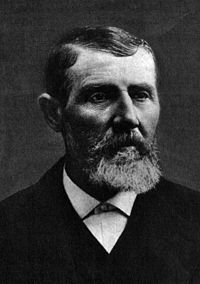Carson Boren
This article needs additional citations for verification. (February 2013) |
Carson D. Boren | |
|---|---|
 | |
| Born | December 12, 1824 |
| Died | August 19, 1912 (aged 87) |
| Resting place | Lake View Cemetery |
| Nationality | United States |
| Occupation | King County Sheriff |
| Known for | Early Founder of Seattle |
| Spouse | Mary Ann Kays |
| Children | Sarah E., Gertrude Livonia |
Carson Dobbins Boren (December 12, 1824 – August 19, 1912) was an early founder of Seattle, Washington (see Denny Party). His sister Mary Ann was married to Arthur Denny, and his sister Louisa to David Denny. Boren was the first King County Sheriff.[1] Seattle's Boren Avenue is named in his honor.[2] Although he was an important figure in the early years of Seattle, historian Junius Rochester writes that "The pioneering contributions of Carson Dobbins Boren to the founding of Alki (in future West Seattle) and Seattle began and ended within a short period of six years."[1]
Biography
Carson Boren was born in Nashville, Tennessee. He married Mary Ann Kays[1] (November 6, 1830 – June 21, 1905[citation needed][3]) on February 18, 1849 at Abingdon, Knox County, Illinois.[citation needed][4] Their first daughter Sarah E. was born December 17, 1849 but died 17 days later and is buried in the Cherry Grove Cemetery in Knox County.[citation needed] A second daughter, Gertrude Livonia (December 12, 1850 – June 3, 1912[citation needed][3]), was carried as an infant on the cross-country trek in 1851 with the Denny Party.[1]
After erecting the first home in what would become downtown Seattle (the previous structures had been at Alki),[1] the couple participated in the early life of Seattle and had two more children, William Richard (October 4, 1854 – January 19, 1899) and Mary Louise (May 3, 1857 – January 1, 1926).[3] In 1855 they sold this property, along with a 320-acre (130 ha) claim extending uphill from the waterfront between what are now James and Marion Streets, to Edward Lander and Charles Terry.[1] The couple argued over Carson's constant hunting trips and giveaways,[citation needed] and by 1860 they separated.[citation needed][5] They were divorced by territorial legislative act December 17, 1861.[6] Their children were raised by the Dennys.[citation needed] Mary Ann went south to The Dalles, Oregon, and established a dressmaking business. There she had another daughter, Lydia Dell Blakeney (January 18, 1869 – October 6, 1921) with John William Blakeney, a divorced man; they married in November 1872, but separated about 1880 and divorced in 1884. Mary Ann and Lydia moved back to Seattle.[citation needed]

Mary Ann Boren apparently kept in touch with her children by Carson Boren and lived with her youngest daughter and son-in-law in what is now the International District of Seattle. When she died in 1905, she was buried in an unmarked grave in Lake View Cemetery, down the hill from where Carson Boren and their unmarried daughter (called Livonia as an adult) are buried in style with the Denny Clan.[citation needed]
Notes
- ^ a b c d e f Junius Rochester, Boren, Carson Dobbins (1824-1912), HistoryLink article #1936, 1998-11-31; corrected 2003-01-12, 2006-02-08. Accessed 2012-11-26.
- ^ Stuart Eskenazi, Denny Party progeny live quietly among us Archived October 8, 2013, at the Wayback Machine, Seattle Times, 2001-06-17. Accessed 2012-11-26.
- ^ a b c [Rochester 1998] gives years, but not exact dates. His years are in agreement with those given here, except for the lifetime of William Richard Boren, for whom he gives 1856–1899.
- ^ Illinois Marriages, 1790-1860, BORING-L Archives, RootsWeb, 2005-08-15. Accessed 2012-11-26. Possibly not a rock-solid source; gives date and Knox County, but does not mention Abingdon.
- ^ [Rochester 1998] says "sometime after 1858."
- ^ CB 4. "An act to dissolve the bonds of matrimony between Carson D. Boren and Mary Boren, his wife". December 17, 1861. Washington Territorial Legislature. Found in Session Laws of the Territory of Washington and the Resolutions and Memorials of the Eighth Regular Session of the Legislative Assembly, Held at Olympia, 1860. Olympia: James Lodge. 1861. p. 74.
